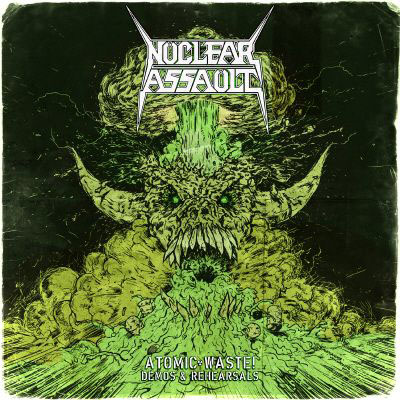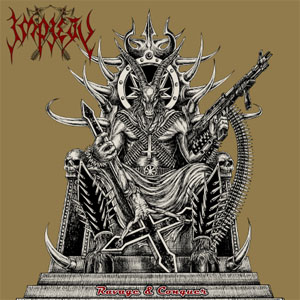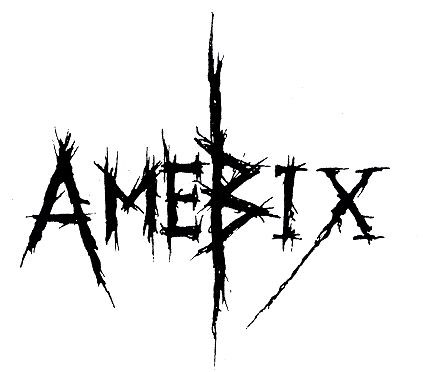 It’s hard to introduce a band who were part of the introduction of the genres upon which this site is based. Along with Discharge, Amebix were the punk half of the formula, influenced by Black Sabbath and Motorhead, a potent brew of inspirations which when mixed with NWOBHM made for the elementals of death metal and black metal. Coming to us from the UK, Amebix were also one of those rare inspirations that believed in the idea before the incarnation, and wanted to give meaning to life where others were satisfied with callow rebellion. Taking time out from practice for the new tour, the Baron gave us a few moments aboard a chartered Italian diesel submarine to keep us in the loop on art, music, life and Amebix.
It’s hard to introduce a band who were part of the introduction of the genres upon which this site is based. Along with Discharge, Amebix were the punk half of the formula, influenced by Black Sabbath and Motorhead, a potent brew of inspirations which when mixed with NWOBHM made for the elementals of death metal and black metal. Coming to us from the UK, Amebix were also one of those rare inspirations that believed in the idea before the incarnation, and wanted to give meaning to life where others were satisfied with callow rebellion. Taking time out from practice for the new tour, the Baron gave us a few moments aboard a chartered Italian diesel submarine to keep us in the loop on art, music, life and Amebix.
The AMEBIX “sound” has appeared as an ingredient in diverse metal and punk genres, and you’re a foundational influence on all crustcore. How did you hit upon this sound? Are there any parallels in visual art, books and movies?
For myself and Stig our approach has always been very instinctual, not having any musical knowledge or training we had to find our way blindly, mainly through the “feel” of a song, and the way we would try and build it up; it is not clever, but it has a simple and honest power. I am not able to tell if there are parallels in other Art, but our particular Silhouette style artwork was also in the same vein, getting a powerful idea across very simply, leaving the viewer to use their imaginative capacity.
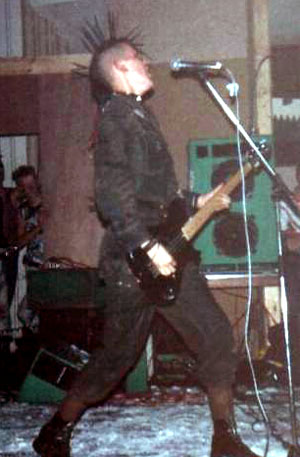 It has been said that, initially, AMEBIX did not use chords to create songs. How did you learn to play music, and did you take advantage of any established theory?
It has been said that, initially, AMEBIX did not use chords to create songs. How did you learn to play music, and did you take advantage of any established theory?
I think the answer above is applicable here too, I learned how to play guitar chords when I moved to Skye, but in a very real sense I found that understanding music in any way actually took away a huge part of the “magic” for me.
From the metal side of things, you cite BLACK SABBATH and MOTORHEAD. What about these bands appealed to you, and what elements of their style did you carry on into AMEBIX?
Well, Motorhead was about energy; Sabbath was for me a very deep band, although subsequent discoveries really place the lyrical side with Geezer, it was a dark band that we could really bring our imagination into sympathy with, like Killing Joke. Music for me is about seeing an internal landscape, and I really tried to make that come alive with Amebix.
In an interview with Romania’s Metalfan, you say “I can’t get into the completely predictable sound of so many bands now, why dont people take a risk and do something unusual?” — do you believe the sound itself is what they must innovate, or is there something that comes before the sound — a realization of what they want to make in music, or an idea they want to communicate — that causes them to pick the sound they want?
I think that actually it is the same as when we started: 99% of people who want to make a band base themselves on someone else; there are so very few that are manifesting anything unique only to themselves. People do not take risks. We grew up with Bowie, T rex, Slade and eventually punk, and believed that it was our job not to be like everyone else, back when punk bands were so diverse and original, pre-Crass/Discharge, etc.
I am also a boring old twat too, which doesn’t give my opinion any credibility.
How did musical illiteracy help or hinder you in creating the music of AMEBIX?
It freed us entirely of understanding and allowed us to manifest our true sound.
The transition from signs which dissimulate something to signs which dissimulate that there is nothing, marks the decisive turning point. The first implies a theology of truth and secrecy (to which the notion of ideology still belongs). The second inaugurates an age of simulacra and simulation, in which there is no longer any God to recognize his own, nor any last judgement to separate truth from false, the real from its artificial resurrection, since everything is already dead and risen in advance…Henceforth, it is the map that precedes the territory – precession of simulacra – it is the map that engenders the territory and if we were to revive the fable today, it would be the territory whose shreds are slowly rotting across the map. – Jean Baudrillard, Live Theory
In the AMEBIX biography, you describe living in squats, moving from “one ruin to another, no sanitation, little electricity, and skip raids for food.” Many people seem to romanticize this lifestyle, but it cannot have been easy. How did it shape the AMEBIX sound?
It is difficult to be objective about this, but there is a cold harshness to some of the music that we put out at this time, it is also unrefined and spontaneous. Not having solid practice places or such we would write a song and that was that. If we could remember it then we would take it into the studio, but we had absolutely no discipline regarding recording, so a lot of the songs are poorly recorded and very primitive in comparison to today’s sound.
Jim Morrison (THE DOORS) sang and wrote repeatedly of a “frontier,” or a no man’s land where chaos and conflict ruled, but also open spaces were present. Was he speaking existentially, politically, or both, and how does this apply to music that loves nature (red in tooth and claw), destruction, emptiness and melancholy loneliness?
Morrison was referred to as either an idiot or a shaman, for me personally I don’t have an interest in The Doors, although Stig does. I don’t know whether this is a poetic sentiment he expresses or a psychological state.
What distinguishes great music from bad? Can it be distilled into technique, or is it something less easily defined?
Great music will cause a reaction good or bad, in the listener. Bad music will play in the background of the elevators of existence.
In the Metalfan interview, you say “Punk was about individuality and creativity, it became a cult of Conformity” — it seems many genres and artistic movements go this way — why do you think this is?
There is a general tendency for people to organise and define themselves into genres and groups, it is an instinctual and general behaviour pattern that stems from insecurity; it is the same root as nationalism, bigotry and religious division. Punk swallowed itself, stupid little people.
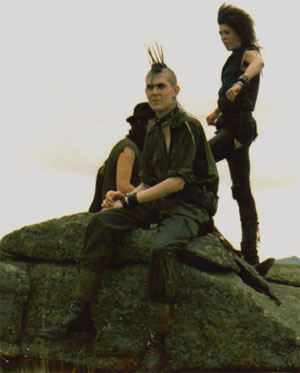 After 17 years, why re-unite AMEBIX? You had said you were tired of playing every variation of A and E chords you knew, and expressed frustration with current music. Are you coming back to change things?
After 17 years, why re-unite AMEBIX? You had said you were tired of playing every variation of A and E chords you knew, and expressed frustration with current music. Are you coming back to change things?
We have an opportunity to redeem ourselves at this point in time, to play as a tight unit using good equipment and with an audience that has actually come to see Amebix. It is of course also partly vanity, but in all honesty this would not have come about if we didn’t meet the mark. There is a ferocity about some of the songs that still remains, and we are really looking forward to playing our “fantasy” gigs, having the backing now that we could only dream of back then. Me and Stig could hear how Amebix should sound back then, but we never had the opportunity to realise it.
One thing that distinguished AMEBIX was that your lyrics were less obviously “political,” or endorsing changes in society, and more focused on values and symbolism, almost like Jungian archetypes. What influenced this, and what did it enable you to express that other methods would not? What do you hope to communicate to the audience this way, and is designed to get past some of their expectations?
My lyrical approach was to create access to internal Landscapes, Archetypes and symbols. This was before I had studied the matter more thoroughly, but I wanted people to bring their own imagination into the Music, and in a sense fill in the spaces, and own that song as their own interpretation of an idea. Ambiguous statements leave room for imaginative interpretation.
In the article about your sword-forging activities, this quote sticks in my mind: “I see the metal as a living thing. It becomes alive when you introduce the elements of fire, coal (earth), air to feed the fire, and water or liquid for the quench.” This reminds me of the movement to sacralize earth and view it as a living thing (Gaia). Do you feel that all of life is alive, or any compatibility with this view that reality itself is sacred? Did you feel this way when making music?
The Forging is an extension of what I was doing then, still trying to be in touch with the elemental forces, although it is 99% a Job now, but I can still get into the right space when I need to.
Once upon a time, in some out of the way corner of that universe which is dispersed into numberless twinkling solar systems, there was a star upon which clever beasts invented knowing. That was the most arrogant and mendacious minute of “world history,” but nevertheless, it was only a minute. After nature had drawn a few breaths, the star cooled and congealed, and the clever beasts had to die. One might invent such a fable, and yet he still would not have adequately illustrated how miserable, how shadowy and transient, how aimless and arbitrary the human intellect looks within nature. There were eternities during which it did not exist. – Friedrich Nietzsche, On Truth and Lies in a Non-Moral Sense
The allusion to living steel is a physical reality, as fire heats up the metal it opens up and begins to move more rapidly as it changes states, when the hammer or Will is applied this will imprint itself into the lattice. The steel will have gone through an actual physical change in accordance with the will of the Smith.
It’s interesting how many punk and metal bands come through modern ideas to discover the ideals traditional societies from a millenium ago, which were: reverence for nature, belief in a transcendental but not dualistic life, independence from humanist morality, desire to create the beautiful and eternal, searching for truth with the self as the lens but not the focus. Do you feel any of these in your own creation?
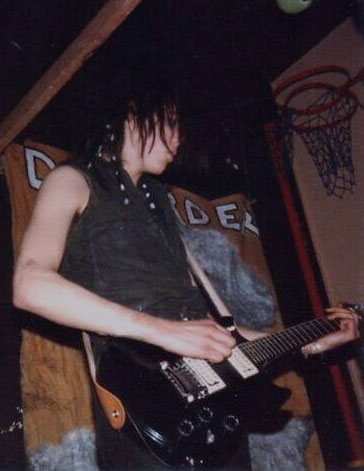 Yes, I absolutely agree with you, transcendence of duality is the goal, to realise that all is from the same.
Yes, I absolutely agree with you, transcendence of duality is the goal, to realise that all is from the same.
The AMEBIX biography says that you have completed enough material for “seven full-length albums.” I have Arise!, Monolith and No Sanctuary (which seems to be a re-released Beginning of the End, whose legality I am unsure of). What am I missing?
Nothing missing, I don’t see where seven full length albums comes from.
Also from the article on sword creation: “What contemporary thinking fails to understand about the alchemists’ attempts to transmute base metal to gold is that they were undergoing a process of personal refinement. Transmutation was an ultimate goal that stimulated the imagination. It was a metaphor for the essential creative process. My sole aim is to take the alchemists’ metaphor and give it substance. To give it a more rational setting.” Are you forging your own soul as you make swords? What role does discipline play in life, and in creation? I ask that because it seems to me that it takes discipline to learn to forge swords, and discipline to make a good one.
Yes, Forging was an extension of other disciplines when I started. It is a fine metaphor that can be used by anyone who is seeking some personal truth.
If sound is like paint, and we use different techniques and portray different things in our paintings, what does it say when a genre sounds similar and has similar topic matter and imagery? Can the genre be said to have a philosophy or culture of its own?
Maybe. I would not like to be stuck in a particular genre. It is important to me to keep moving, and not try and fit in. The person who leaves the tribe will have the adventure and come back with the Story that will change the Tribe, if they can listen.
When we feel ourselves to be sole heirs of the universe, when “the sea flows in our veins … and the stars are our jewels,” when all things are perceived as infinite and holy, what motive can we have for covetousness or self-assertion, for the pursuit of power or the drearier forms of pleasure? Contemplatives are not likely to become gamblers, or procurers, or drunkards; they do not as a rule preach intolerance, or make war; do not find it necessary to rob, swindle or grind the faces of the poor. And to these enormous negative virtues we may add another which, though hard to define, is both positive and important. The arhat and the quietist may not practice contemplation in its fullness; but if they practice it at all, they may bring back enlightening reports of another, a transcendent country of the mind; and if they practice it in the height, they will become conduits through which some beneficent influence can how out of that other country into a world of darkened selves, chronically dying for lack of it. – Aldous Huxley, The Doors of Perception
Do you believe objective reality exists?
I don’t believe that we have the sensory ability to discern things on a higher level, that intimation can come through Symbolism and Visionary experience, but I cannot answer that with any authority at all.
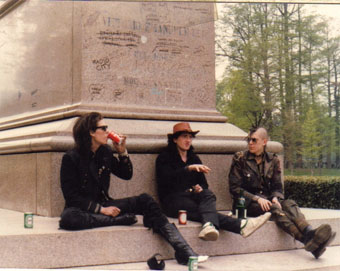 Any plans to write a book about the AMEBIX experience, and what the punk/metal movement meant at the time? The “Risen” DVD sounds like it has some inclinations in this direction?
Any plans to write a book about the AMEBIX experience, and what the punk/metal movement meant at the time? The “Risen” DVD sounds like it has some inclinations in this direction?
I started to write a book some years ago; this has been shelved for now, but I may take it up again when I am in my dotage.
The world needed punk when it happened, but not much has changed, yet the music seems less relevant. Is there a way to make it relevant again? Dare I ask… Is that what motivated you to break your silence and return?
I think the Spirit of Punk got lost a long time ago, but it can be found popping up in other Cultural milieu. A lot of the scene was just a parody of an idea, although some people lived it. I like to think that you can keep that spirit alive in the way you live your life, not who or what you identify with, keep an open mind, allow new ideas to come in.
Just as only one out of 100,000 has the talent to be an engineer or an acrobat, only a few are capable of managing the matters of a nation or humankind…In this time and this part of the world we are headlessly hanging on to democracy and the parliamentary system, even though these are the most mindless and desperate experiments of humankind…In democratic coutries destruction of nature and sum of ecological disasters has accumulated most. – Pentti Linkola, Can Nature Win?
No Comments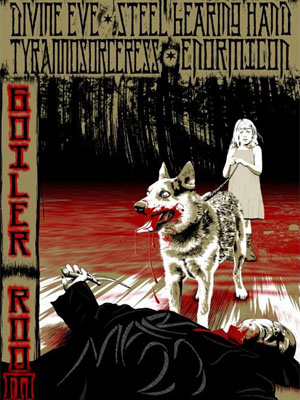 We were fortunate enough to hear a preview of the new 2012 album from Texas doom/death occult conjurers DIVINE EVE. The result is resonantly good: further developing the sounds of their last EP, Vengeful and Obstinate, the band have filtered their classic material through its own influences and brought out a stronger, clearer version.
We were fortunate enough to hear a preview of the new 2012 album from Texas doom/death occult conjurers DIVINE EVE. The result is resonantly good: further developing the sounds of their last EP, Vengeful and Obstinate, the band have filtered their classic material through its own influences and brought out a stronger, clearer version.